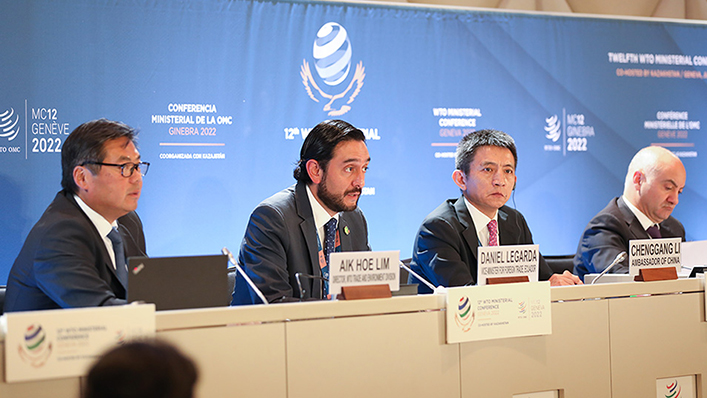
Senior officials representing four co-coordinators announced the release of the statement at an event held on 13 June during the 12th Ministerial Conference (MC12). Participants included the Hon. Daniel Legarda, Ecuador’s Vice Minister for Foreign Trade, H.E. Ambassador George Mina of Australia, H.E. Ambassador Chenggang Li of China and the Hon. Faiyaz Loya, Fiji’s Minister of Commerce, Trade, Tourism and Transport. To date, 72 WTO members have joined the Dialogue, representing more than 75 per cent of global plastics trade.
DDG Zhang hailed the substantial progress achieved on trade and environment issues since the launching of three ministerial statements in December 2021. He called for more ministers to support the dialogue on plastic pollution at MC12 and highlighted the critical need for engaging developing members, in particular least-developed countries (LDCs), and improving their response to the complex environmental challenges.
Minister Daniel Legarda highlighted the unique environmental challenges that small and highly diversified countries face. He reiterated Ecuador’s firm support for the collective efforts to tackle a wide range of environmental issues, in particular through its engagement in the UN-led negotiation process for an international agreement to end plastic pollution and in the dialogue at the WTO. Plastics pollution is a global challenge, which “requires decisive and coordinated action by multiple actors, state, international organizations, academia and research centres and those who can contribute with solutions across the whole life cycle of plastic production, trade and consumption,” he said.
Ambassador George Mina said: “We are seeing a shift in the role of the WTO to become really the centre of trade policy. And trade and trade policy have to be a part of the solution on the environment.” He said the ministerial statement signifies the beginning of a broader and deeper cooperation among members and with stakeholders. Co-coordinators are stepping up collaboration with other international organizations, he said, and stepping up policy and information exchange efforts so that everyone learns from one another.
Ambassador Li Chenggang said that the work at the WTO is more important than ever, especially as the UN recently issued a resolution launching negotiations on a new treaty on plastic pollution. He also said the Dialogue on Plastic Pollution will keep development as a high priority and will commit to do more to strengthen trade-related capacity building and technical assistance for LDCs and small island developing states.
Minister Faiyaz Loya said the Dialogue will strive to strengthen its work and find innovative and creative solutions to tackle plastics pollution. He urged those members who have not joined the group to become participants and to leverage trade and trade policies to reduce plastic pollution.
Ministerial statement
The ministerial statement highlights the substantial progress achieved by the Dialogue in the past few months.
It pledges concrete steps to deepen the engagement with other global initiatives in addressing plastics pollution, notably the launch of negotiations at the UN’s Environment Assembly (UNEA) in March and the aim of reaching a global deal on plastic pollution by 2024. It also notes the ongoing work of the World Customs Organization to amend the definition of plastic wastes in Harmonised System (HS) tariff codes in support of the Basel Convention Plastics Amendment.
The statement also outlines steps to strengthen transparency, technical discussions and trade-related capacity building for least-developed members, including through the Aid for Trade review and needs assessment survey (INF/TE/IDP/W/8), a proposed event at the 8th Aid for Trade Global Review in July, a survey of members’ trade-related plastics measures (INF/TE/IDP/W/7) and a workshop on sustainable and effective plastic substitutes and alternatives.
The statement confirms the Dialogue will continue to be an open, inclusive and transparent process and invites all WTO members to join, with a view to generating more concrete outcomes by the next Ministerial Conference (MC13).
More information is available on the Dialogue’s dedicated page.
Share
Reach us to explore global export and import deals